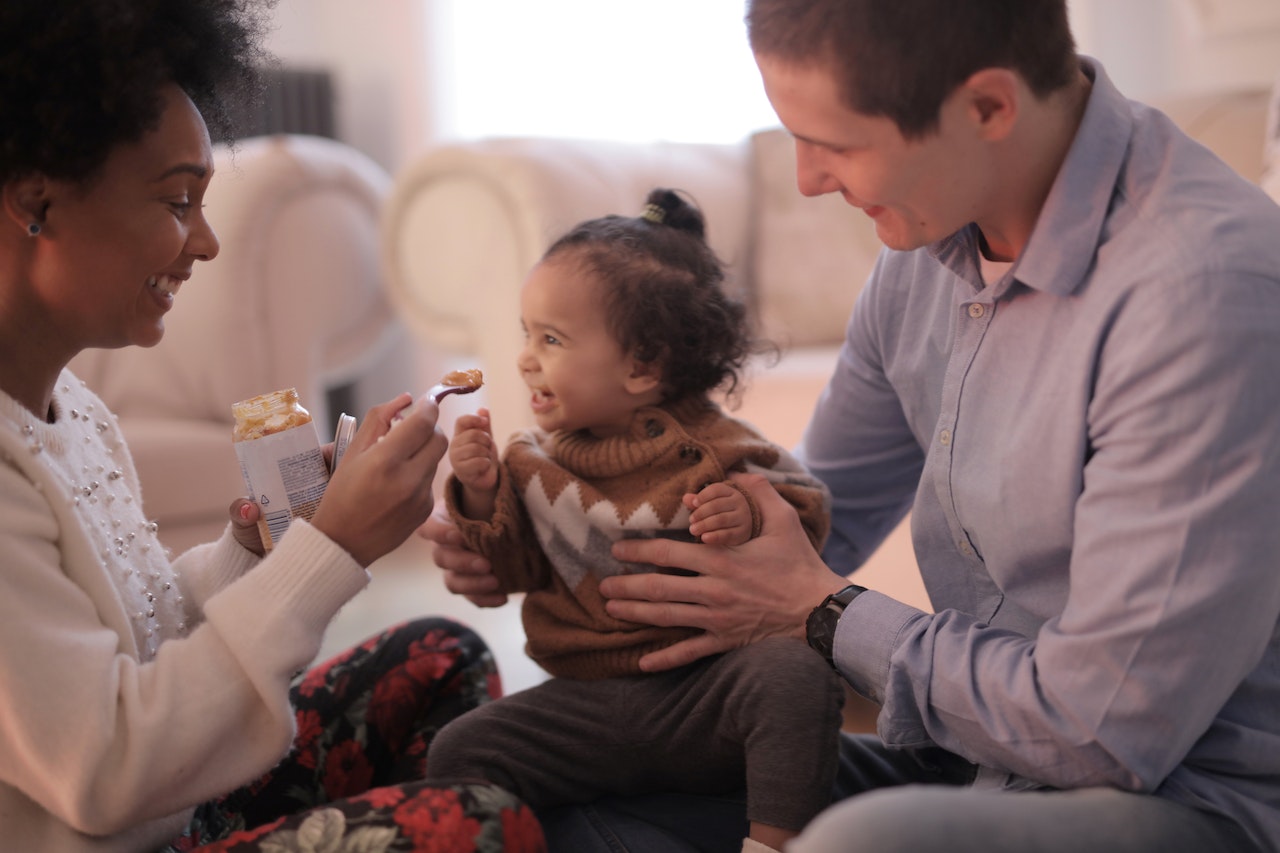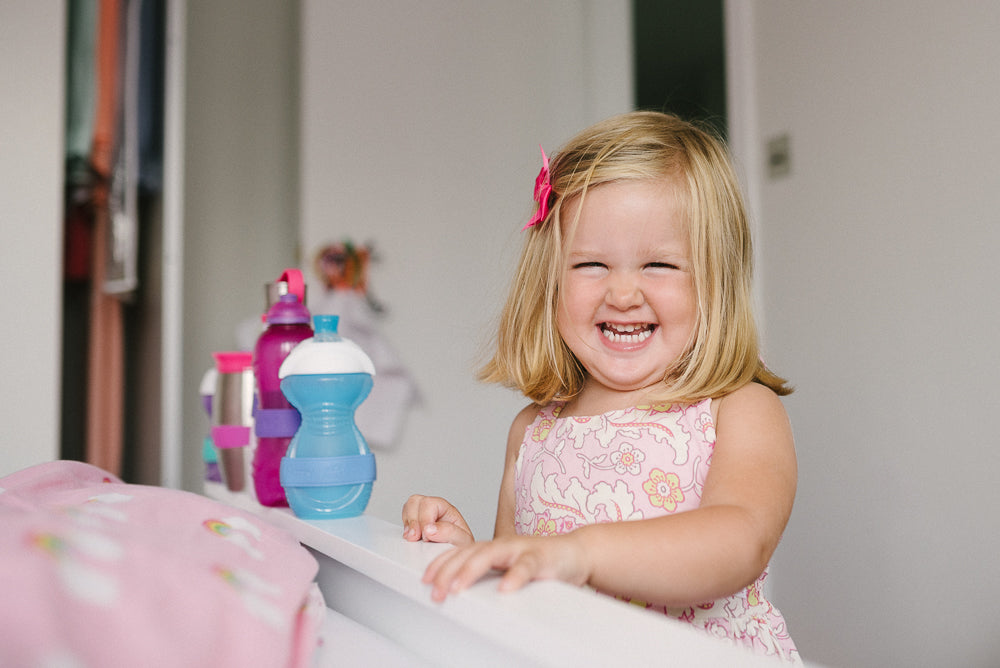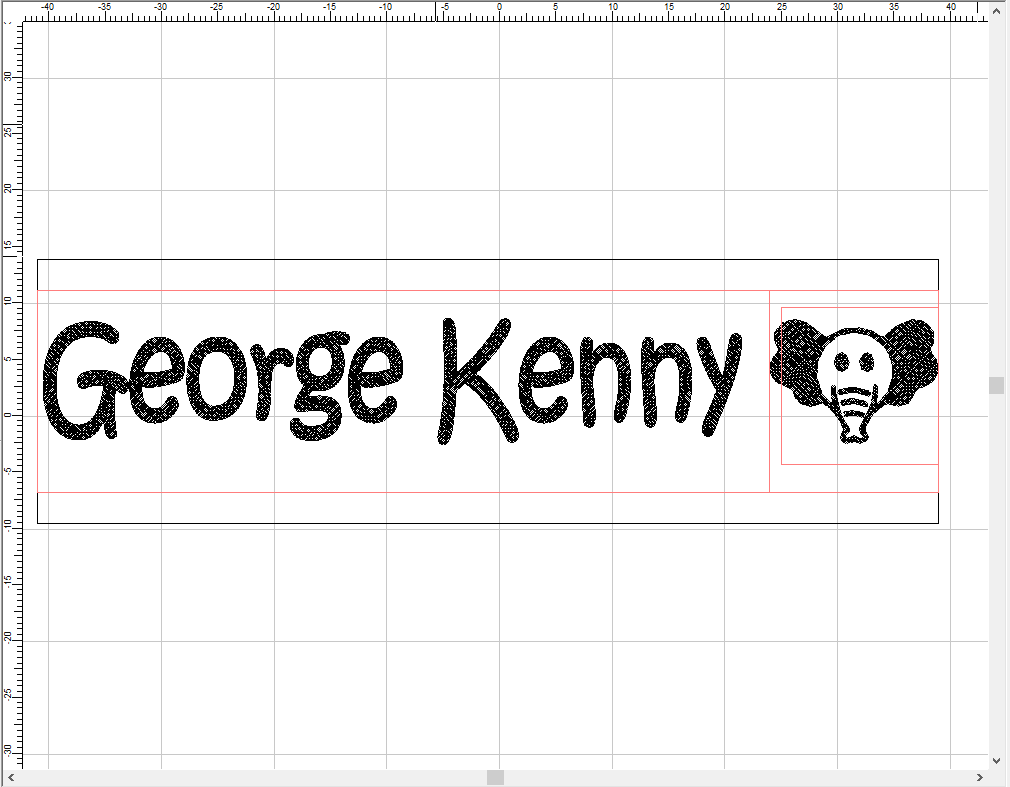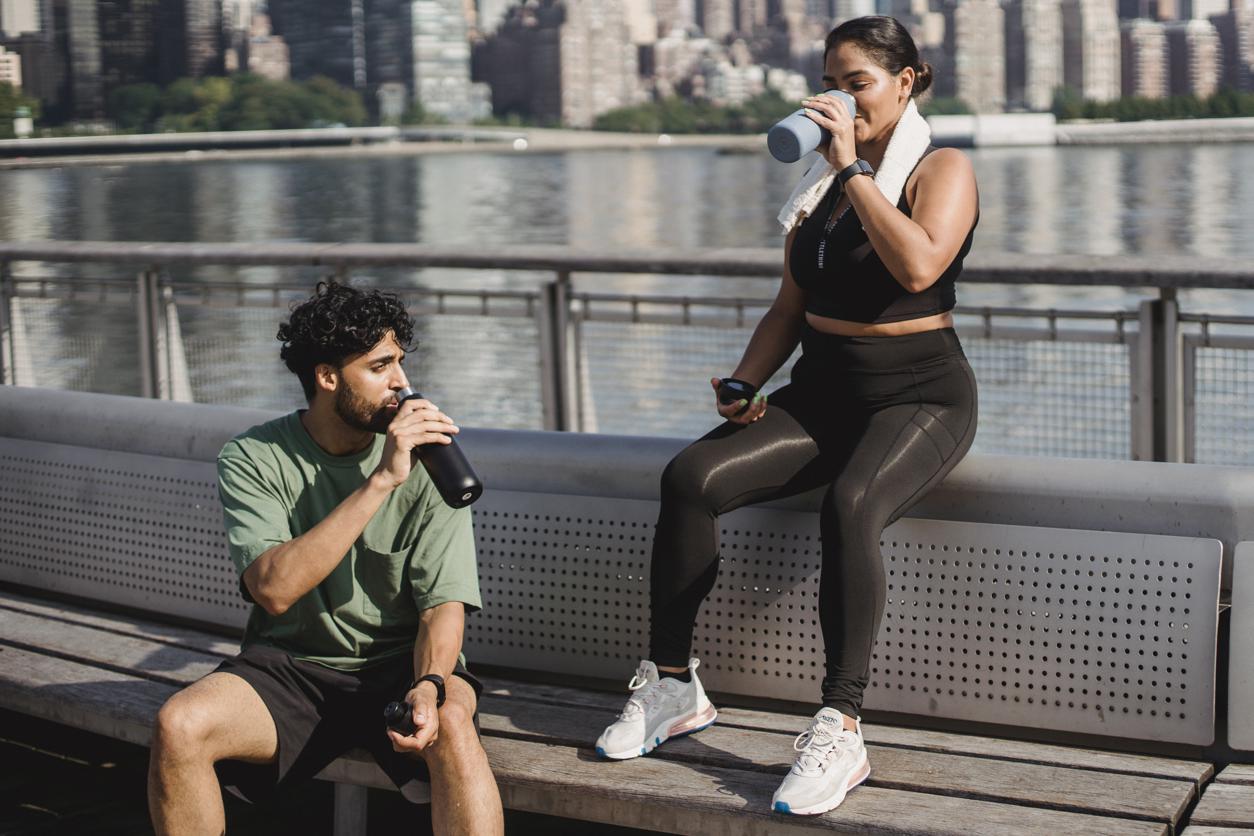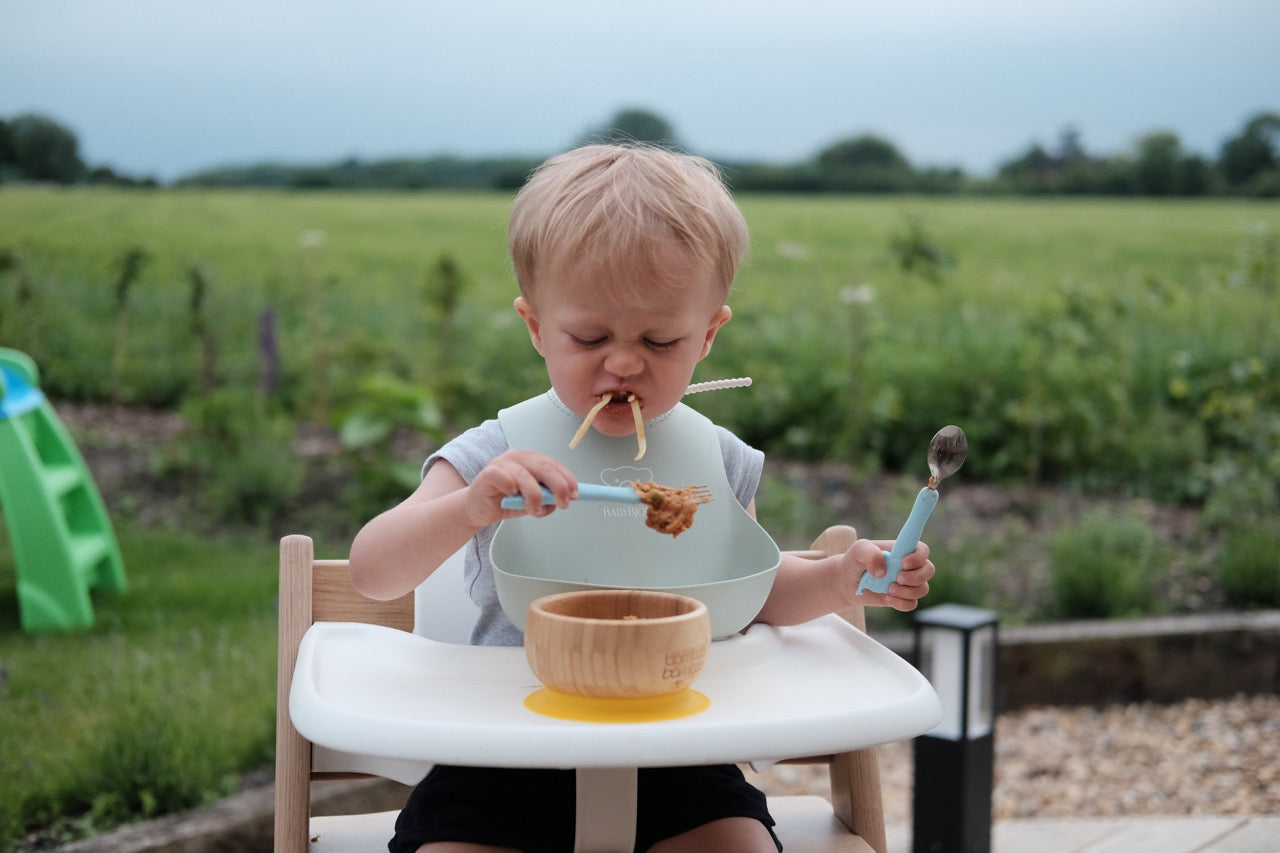At minaym, we’ve come up with a range of Personalised Baby Weaning Spoons, Personalised Toddler Cutlery, Personalised Bibs and Drinking Cups as well as Toddler Snack Pots - all designed to help your toddler with their journey to independent eating. Before we take a closer look at utensils, let’s have a look at how your toddler progresses from watching the rest of the family eat as a baby to being able to use a knife and fork fluently as a schoolchild……
First steps to independent eating
Right from the start, your baby is taking in sounds - and those include the happy sounds of mealtimes. At first you might hold your baby during a meal or even feed from breast or bottle while you are eating - they will take in the convivial atmosphere and enjoy feeling part of the mealtime.

When your baby is old enough to sit up in a high chair, at around six months, they are usually keen to join in with family meals. Baby led weaning is a really great way for your little one to learn to feed themselves.
We’ve got an award winning Personalised Baby Led Weaning Spoon made from silicone that is ideal for your baby to grab when they’re starting to use cutlery. Our baby led weaning spoon is safe for babies from six months to use - at this age they will enjoy exploring the spoon, banging it on the table and perhaps sucking and chewing on it, getting an idea of how it feels to hold and what it feels like in their mouths.
Between the ages of 9 and 13 months, babies enjoy testing out soft foods and foods that will break up easily in their mouths, like breadsticks, scrambled egg, porridge, banana and avocado. By 14 months they are moving into becoming toddlers, and are fast learning a lot of skills. They can now probably use a spoon effectively to get food into their mouths - although this will still be very messy! By the age of two children are usually keen to eat independently.

Between two and three years toddlers can usually use a fork to stab food, and by 5 years they can often spread with a knife. Learning to use a knife and fork properly at table, with a knife cutting food, is a complex set of skills and sometimes takes until primary age to achieve.
How do I help my toddler learn cutlery skills?
Positioning
Sitting in the right position and at the right height is important! A good high chair is an essential - check that your child’s back and feet are supported and that they are sitting at a comfortable height for eating. Too low or too high will cause your little one to have difficulties and will probably mean a lot more spilled food! It could also hinder the development of their cutlery skills.Set out the utensils in the same way
As your toddler is learning a new skill - independent eating and using cutlery - it’s a really good idea to follow a routine for mealtimes and always set out the cutlery in the same way. After all, it’s accepted etiquette to do this for adults, so why not for little ones too?Don’t rush your toddler
It’s easy to be impatient with mealtimes especially if you’re in a rush. Try to give your toddler time to experiment with cutlery and food - if you’re rushed and stressed then they will pick this up and feel uncomfortable themselves.
Practice makes perfect!
You’ve got to practise any new skill to get it right, and using cutlery is no exception! Make sure you give your child lots of opportunities to try out their cutlery skills!Break things down into small parts
Don’t expect your toddler to get the whole mealtime routine all at once! Break what they have to do down into small chunks. Practise with a fork for example rather than giving knife, fork and spoon all together, minimise the confusion!Assist, demonstrate, tell
You can help your child with independent eating in several ways. You can help them physically with holding the cutlery and using it; you can show them how to use the cutlery, modelling yourself; you can verbally tell your toddler how to use the cutlery. It’s best to try a combination of all of these methods to give your child a good idea of what to do.Using a knife - work on one thing at a time
Knife skills are quite tricky - maybe spend time showing your little one how to spread, then, when they’ve got the hang of that, you could demonstrate how to cut something. It might take days or weeks to perfect one skill so don’t be impatient!Knife skills may take years to get right, so be relaxed about it!
Play
Using play cutlery and food is a great idea! Your child can organise a whole tea party for dolls or teddies, all with knives and forks to use. Play is the perfect way to model new skills!

Play dough is brilliant for practising cutting! Make sure you do this when your child isn’t hungry though!
Once they start using cutlery with ‘real’ food, make sure they are trying to cut softer things before tackling harder, more difficult foods. Working with the easier to cut foods will give them confidence to tackle the harder things!
You can also ask an older child to help you prepare vegetables for a meal, showing them how to cut each one. Of course supervise your child carefully and start with easier to cut vegetables like cucumber or mushrooms perhaps.
Minaym Personalised Infant Cutlery and Tableware
Don’t forget - our personalised Baby Led Weaning Spoons are ideal as first cutlery, made from tactile, suckable silicone that’s easy for a baby to grab and use. For toddlers starting the journey to independent eating, our Personalised Infant Cutlery is perfect. Both are topped with animal motifs - friendly faces at mealtimes - and both have smooth silicone handles, specially shaped to fit into little hands.
Our cutlery comes in pastel shades designed to calm chaotic mealtimes! Personalised toddler cutlery and personalised Baby Led Weaning Spoons make fantastic gifts for birthdays and other occasions too!
Added to cutlery, you’ll need a range of other tableware to help your child join in at mealtimes. Of great importance is a good plate - preferably one with a suction base to reduce those mealtime spills and to make it easy for your child to eat without the plate sliding about! At minaym we’re developing a silicone suction plate - watch this space for more!
A good toddler drinking cup is another essential - once your child wants to start drinking from an open cup there’s a whole range on the market for you to choose from. We offer a flexible, Personalised Toddler Drinking Cup made from silicone - it’s organic feeling, moulding into your toddler’s hands rather than being rigid. This feels more natural and comfortable, making the progression from closed to open cup easier.
For those snacks on the move, our Toddler Snack Pot is handy, and can also double as an open drinking cup if you remove the lid. With the lid on, your toddler can dip a hand into the pot through the petals of silicone and grab a snack without the danger of it falling out if the pot is turned upside down.
Along with our Personalised Bottle Bands which are ideal for naming water bottles and drinking cups too, we’ve got a great selection of toddler tableware and cutlery to choose from whether you’re looking for a personalised toddler gift or something stylish and practical for your own child. Take a look in our shop to see the full range.
Remember that cutlery skills take a long time to perfect - be relaxed, make it fun, expect mess - enjoy family mealtimes with your toddler!
You can also check out our feeding a toddler blog to learn more and get more tips!
Bibliography:
https://www.nhsggc.org.uk/kids/resources/ot-activityinformation-sheets/using-cutlery-information-sheet/
https://www.cambscommunityservices.nhs.uk/docs/default-source/bedfordshire-childrens-services/Beds---Developmental-Skills-Package/development-of-cutlery-skills.pdf?sfvrsn=0


